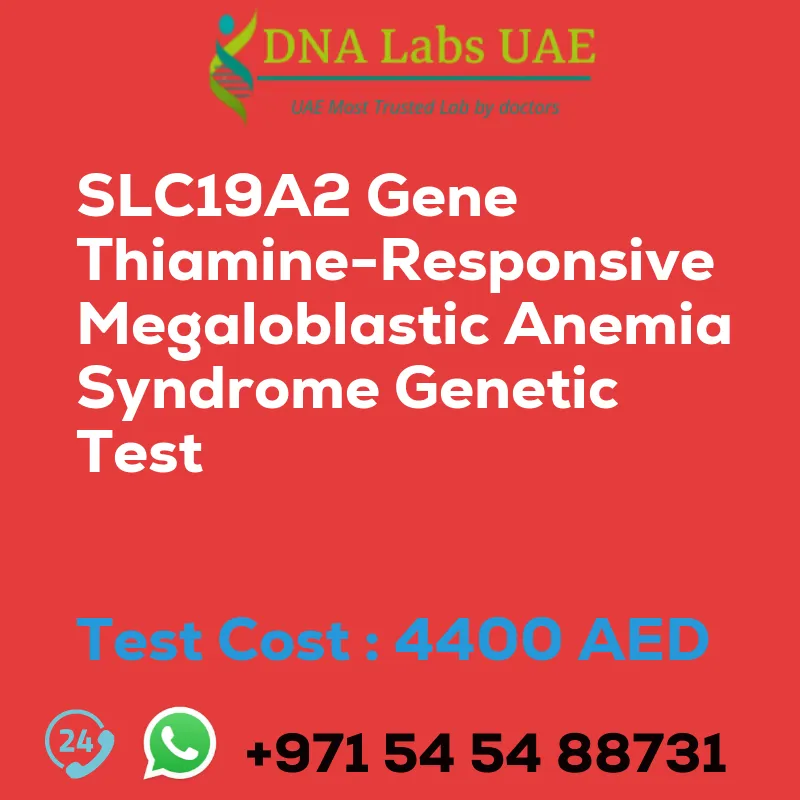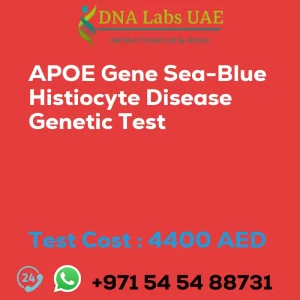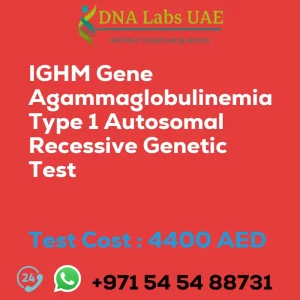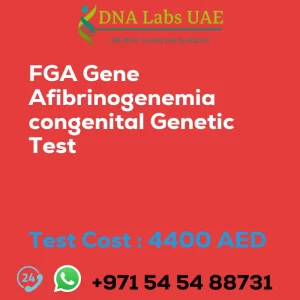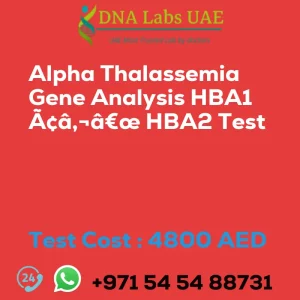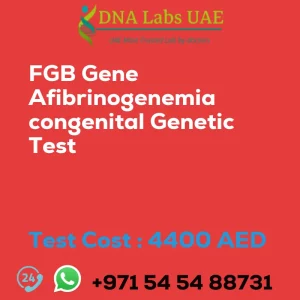SLC19A2 Gene Thiamine-responsive megaloblastic anemia syndrome Genetic Test
Are you concerned about Thiamine-responsive megaloblastic anemia syndrome? DNA Labs UAE offers the SLC19A2 Gene Thiamine-responsive megaloblastic anemia syndrome Genetic Test to help diagnose this rare autosomal recessive disorder.
Test Details
The SLC19A2 gene is associated with Thiamine-responsive megaloblastic anemia syndrome (TRMA). TRMA is characterized by megaloblastic anemia, diabetes mellitus, and sensorineural deafness. Our NGS (Next-Generation Sequencing) genetic testing method allows for the simultaneous analysis of multiple genes, including the SLC19A2 gene, to identify mutations or variants that may be responsible for the syndrome.
Test Components and Price
- Test Name: SLC19A2 Gene Thiamine-responsive megaloblastic anemia syndrome Genetic Test
- Price: 4400.0 AED
Sample Condition
We accept blood samples, extracted DNA, or one drop of blood on an FTA card for this test.
Report Delivery
Reports are typically delivered within 3 to 4 weeks.
Method
We use NGS (Next-Generation Sequencing) technology for this genetic test.
Test Type
This test falls under the category of Hematology.
Doctor and Test Department
This test is conducted by a Hematologist and falls under the Genetics department.
Pre Test Information
Prior to the test, it is recommended to provide the clinical history of the patient who is undergoing the SLC19A2 Gene Thiamine-responsive megaloblastic anemia syndrome NGS Genetic DNA Test. A Genetic Counselling session will also be conducted to draw a pedigree chart of family members affected by the syndrome.
About Thiamine-responsive megaloblastic anemia syndrome
Thiamine-responsive megaloblastic anemia syndrome (TRMA) is a rare autosomal recessive disorder characterized by megaloblastic anemia, diabetes mellitus, and sensorineural deafness. Individuals with TRMA may experience a range of symptoms, including fatigue, pale skin, enlarged red blood cells, increased thirst and urination, and hearing loss.
NGS Genetic Testing
NGS genetic testing is a powerful tool that allows for the rapid and accurate sequencing of large amounts of DNA. It can be used to identify mutations or variants in the SLC19A2 gene that may be responsible for Thiamine-responsive megaloblastic anemia syndrome. By analyzing the SLC19A2 gene using NGS, clinicians can provide an accurate diagnosis, genetic counseling, and potentially targeted treatment options for individuals with the syndrome.
Don’t let Thiamine-responsive megaloblastic anemia syndrome go undiagnosed. Contact DNA Labs UAE today to schedule your SLC19A2 Gene Thiamine-responsive megaloblastic anemia syndrome Genetic Test.
| Test Name | SLC19A2 Gene Thiamine-responsive megaloblastic anemia syndrome Genetic Test |
|---|---|
| Components | |
| Price | 4400.0 AED |
| Sample Condition | Blood or Extracted DNA or One drop Blood on FTA Card |
| Report Delivery | 3 to 4 Weeks |
| Method | NGS Technology |
| Test type | Hematology |
| Doctor | Hematologist |
| Test Department: | Genetics |
| Pre Test Information | Clinical History of Patient who is going for SLC19A2 Gene Thiamine-responsive megaloblastic anemia syndrome NGS Genetic DNA Test. A Genetic Counselling session to draw a pedigree chart of family members affected with SLC19A2 Gene Thiamine-responsive megaloblastic anemia syndrome NGS Genetic DNA Test gene SLC19A2 |
| Test Details |
The SLC19A2 gene is associated with Thiamine-responsive megaloblastic anemia syndrome (TRMA). TRMA is a rare autosomal recessive disorder characterized by megaloblastic anemia, diabetes mellitus, and sensorineural deafness. NGS (Next-Generation Sequencing) genetic testing is a type of genetic testing that allows for the simultaneous analysis of multiple genes or even the entire genome. It uses high-throughput sequencing technologies to rapidly and accurately sequence large amounts of DNA. NGS genetic testing can be used to identify mutations or variants in the SLC19A2 gene that may be responsible for Thiamine-responsive megaloblastic anemia syndrome. By analyzing the SLC19A2 gene using NGS, clinicians can identify specific mutations or variants that may be causing the disorder. This information can be used for accurate diagnosis, genetic counseling, and potentially targeted treatment options for individuals with Thiamine-responsive megaloblastic anemia syndrome. |

